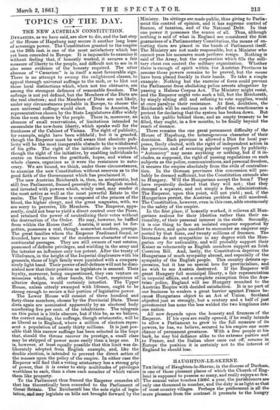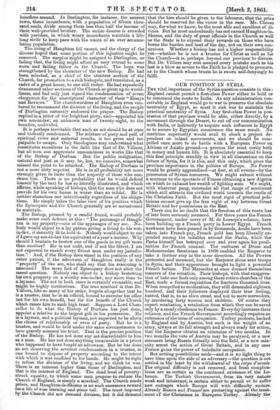HAUGHTON-LE-SK_ERNE.
Tna living of Haughton-le-Skerne, in the diocese of Durham, is one of those pleasant places of which the Church of Eng- land is supposed to possess so many, and really enjoys so few. The annual value touches 13001. a year, the parishioners are only one thousand in number, and the duty is as light as that of most country villages. Perhaps the preferment is all the more pleasant from the contrast it presents to the hungry benefices around. In Darlington, for instance, the nearest town, three incumbents, with a population of fifteen thou- sand souls, divide among them less than half the income of their well-provided brother. The entire diocese is crowded with parishes, in which weary incumbents maintain a life- long strife to keep pace with the wants of an ever accumu- lating population. The living of Houghton fell vacant, and the clergy of the diocese hoped that some portion of this injustice might be removed. The surplus might be assigned to Darlington, or failing that, the living might afford an easy retreat to some worn and failing father in the Church. The hope was strengthened by the character of the new Bishop. He had been selected, as a chief of the straitest section of the Church, for promotion to a rich bishopric, and translated, as a cadet of a great house, to one still richer. He had repeatedly denounced other sections of the Church as given up to world- liness, and had only just signed the condemnation of seven clergymen for the unscriptural character , of their "Essays and Reviews." The churchwardens of Houghton even ven- tured to recommend the division of the living, and the people of Darlington earnestly endorsed the prayer. The Bishop replied in a letter of the brightest piety, and—appointed his own son-in-law, an unknown man of twenty-eight, to the benefice, undivided.
It is perhaps inevitable that such an act should be at once and violently condemned. The mixture of piety and pelf, of spiritual views and material results, is too gross and too palpable to escape. Only theologians may understand what constitutes soundness in the faith like that of Dr. Villiers, but all men can appreciate unsoundness in works like that of the Bishop of Durham. But the public indignation, natural and just as it may be has, we conceive somewhat missed the point to be attacked. The Bishop of ' Durham is not a mere dirty nepotist. He is in all probability not more strongly given to lucre than the majority of those who con- demn him. There is no probability that he would defend himself by the text he has so literally illustrated, and which affirms, while speaking of bishops, that the man who does not provide for his own house is worse than an infidel. He is neither shameless nor intentionally regardless of his obliga- tions. He simply takes the false view of his position which the Episcopate and the Church generally are so accustomed to maintain.
The Bishop, pressed by a candid friend, would probably make some such defence as this : "The patronage of Hough- ton is my property—one of the appanages of my see. No- body would object to a lay patron giving a living to his son- in-law, if decently fit to hold it. Nobody would object to me if I gave my Bon-in-law the equivalent of a year's income. Why should I hesitate to bestow one of the goods in my gift more than another? He is not unfit, and if not the fittest, I am not expected to enrich every fittest man under my jurisdic- tion." And, if the Bishop does stand in the position of any other patron, if the advowson of Houghton really is the "property" of the see, who shall say that his reasoning is unsound The mere fact of Episcopacy does not alter the moral question. Nobody can object to a bishop bestowing his own property on a worthy eon-in-law, any more than to a layman. The act in both cases is certainly excusable, and might be highly meritorious. The true mischief is that Dr. Villiers, like so many of his order, forgets altogether that he is a trustee, that he is an official, bound to exercise his office not for his own benefit, but for the benefit of the Church which raises him to such high trust. Suppose a Lord Chan- cellor to do what the Bishop of Durham has just done, appoint a relative to the largest gift in his possession. He is a layman, and a political layman, not expected to be above the claims of relationship or even of party. But he is a trustee, and would be held under the same circumstances to have gravely misused his trust. That is the precise position of the Bishop. He has not done any act discreditable to him as a man. He has not done anything inexcusable in a priest who happened to have bought an advowson. But he has done an act deserving the severest condemnation in a trustee, in one bound to dispose of property according to the intent with which it was confided to his hands. He might be right to refuse the division of the living, and we think he was. There is an interest higher than those of Darlington, and that is the interest of England. .The dead level of poverty- struck equality, to which some men propose to reduce the Church of England, is simply a mischief. The Church needs prizes, and Haughton-le-Skerne is no such enormous reward for a life of wise learning and pious toil. The trust imposed by the Church did not demand division, but it did demand that the hire should be given to the labourer, that the prize should be reserved for the victor in the race. Mr. Cheese may, for what we know, be the most able and excellent of di- vines. But he most undoubtedly has not earned Haughton-le- Skerne, and the duty of great officials in the Church as well as the State is to expend their rewards on those who have borne the burden and heat of the day, not on their own con- nexions. Whether a bishop has not a higher responsibility yet—whether he is not a trustee for Christ as well as for the Church—it is, perhaps, beyond our province to discuss. But Dr. Villiers may rest assured every mistake such as his last is a blow as severe to the Faith he is pledged to promote, as to the Church whose trusts he is sworn self-denyingly to































 Previous page
Previous page